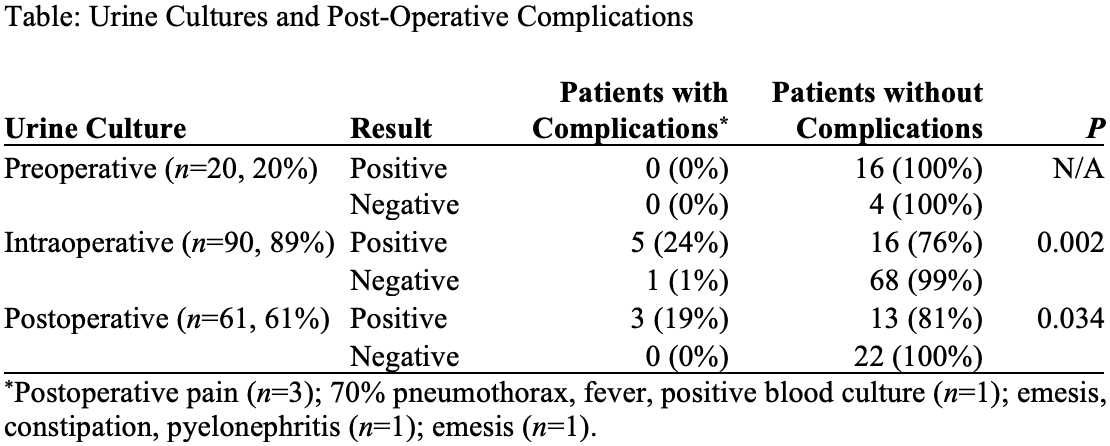Back
Poster, Podium & Video Sessions
Moderated Poster
MP17: Pediatric Urology: Upper & Lower Urinary Tract
MP17-01: Are pre-operative urine cultures and cystoscopies before ureteral reimplantation clinically useful or cost effective?
Friday, May 13, 2022
4:30 PM – 5:45 PM
Location: Room 225
Mark Quiring*, Erin Davis, Dawson Hinkley, Tyler Hamby, Kristy Reyes, Kirk Pinto, Fort Worth, TX

Mark Edmond Quiring, Jr., BS
UNTHSC TCOM
Poster Presenter(s)
Introduction: Ureteral reimplantation remains the primary treatment for patients with vesicoureteral reflux (VUR) and recurrent urinary tract infections (UTI). Cystoscopies may be performed just prior to reimplantation to rule out the presence of anatomic abnormalities, which may change the course of the procedure. Additionally, urine cultures may be obtained preoperatively for patients with VUR, even if asymptomatic for UTI. The goal of this study was to evaluate if preoperative urine cultures and/or cystoscopies offer a clinical advantage in pediatric patients undergoing ureteral reimplantation.
Methods: A retrospective review of patients who underwent ureteral reimplantation for VUR between March 2018 and April 2021 at Cook Children’s Medical Center in Fort Worth, TX was performed. Variables included demographics, urine cultures, whether cystoscopies were performed, whether cystoscopies altered the surgeons’ planned procedure, and complications.
Results: There were 101 patients (28% male) who met inclusion criteria. The median (range) age was 3.98 (0.56-10.93) years at surgery. There were 46 (46%) patients with cystoscopies, but cystoscopy did not alter the surgical procedure for any patient. Twenty (20%) patients had urine cultures (80% positive) in the month preceding reimplantation; 90 (89%) patients had urine cultures (23% positive) on date of reimplantation; and 38 (38%) patients had urine cultures (42% positive) in the month following reimplantation. There were no interventional complications. Of the 6 patients with post-operative complications, none had preoperative urine cultures. Those with positive urine cultures on date of surgery (24% vs. 1%; OR=21.25; P<0.01) and after surgery (19% vs. 0%; P=0.03) were more likely to have non-interventional complications (see Table).
Conclusions: Cystoscopies and asymptomatic urine cultures obtained prior to ureteral reimplantation provide limited to no additional benefit for patients. Obtaining either without reasonable cause may bring about avoidable cost or inconvenience for patients and their families. Further research is needed to thoroughly identify the role that cystoscopies and urine cultures serve for patients undergoing ureteral reimplantation for VUR.
Source of Funding: None.

Methods: A retrospective review of patients who underwent ureteral reimplantation for VUR between March 2018 and April 2021 at Cook Children’s Medical Center in Fort Worth, TX was performed. Variables included demographics, urine cultures, whether cystoscopies were performed, whether cystoscopies altered the surgeons’ planned procedure, and complications.
Results: There were 101 patients (28% male) who met inclusion criteria. The median (range) age was 3.98 (0.56-10.93) years at surgery. There were 46 (46%) patients with cystoscopies, but cystoscopy did not alter the surgical procedure for any patient. Twenty (20%) patients had urine cultures (80% positive) in the month preceding reimplantation; 90 (89%) patients had urine cultures (23% positive) on date of reimplantation; and 38 (38%) patients had urine cultures (42% positive) in the month following reimplantation. There were no interventional complications. Of the 6 patients with post-operative complications, none had preoperative urine cultures. Those with positive urine cultures on date of surgery (24% vs. 1%; OR=21.25; P<0.01) and after surgery (19% vs. 0%; P=0.03) were more likely to have non-interventional complications (see Table).
Conclusions: Cystoscopies and asymptomatic urine cultures obtained prior to ureteral reimplantation provide limited to no additional benefit for patients. Obtaining either without reasonable cause may bring about avoidable cost or inconvenience for patients and their families. Further research is needed to thoroughly identify the role that cystoscopies and urine cultures serve for patients undergoing ureteral reimplantation for VUR.
Source of Funding: None.


.jpg)
.jpg)